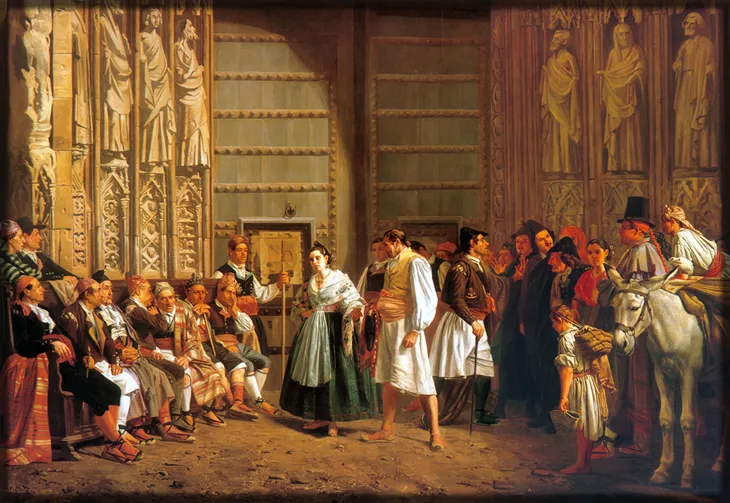Drink in History at the World’s Oldest Court
Valencia’s water tribunal doesn’t have written records or lawyers—but that doesn’t mean it’s outdated
/https://tf-cmsv2-smithsonianmag-media.s3.amazonaws.com/filer/9e/8e/9e8e7af3-0508-46a9-8873-a3bc23606daf/1200px-the_tribunal_de_las_aguas_of_valencia.jpg)
It happens every Thursday at noon. In a corner of Plaza de la Virgen in Valencia, Spain, throngs of people amass near the Apostles Gate of the city’s central cathedral, forming a half-circle around eight leather chairs surrounded by an iron fence. At the last stroke of the cathedral’s bell, eight men garbed in short, black robes walk towards the chairs in a straight line and take their seats. The world’s oldest court—one that’s operated for over 1,000 years—is now in session.
The Tribunal de les Aigües de la Vega de Valéncia (in Valenciano) was most likely established during Roman times, but assumed its current form when the Caliphate of Cordoba reigned over the Iberian peninsula more than a millennium ago. The rulers of al-Andaluz created an extensive network of canals—and disagreements over water followed. To safeguard water and make enough available for everyone for drinking, irrigation, public bathing and waste disposal, a court was born.
Modeled on tribal councils, the court was tasked with resolving water disputes among farmers and maintaining peace in the community. It was such a success that when King James I of Aragon reclaimed the principality of Valencia in 1238, he decreed that the water tribunal was to remain “as was established and become custom” in the area.

During the Caliphate, water disagreements were resolved inside the main mosque, but with the arrival of Christian rule the mosque was destroyed and a cathedral erected in its place. For Muslims, who still made up the majority of the farming community, entering the cathedral was prohibited. To accommodate all claimants, the tribunal migrated to just outside the door.
Not much has changed since. Every Thursday (the day before Muslims’ traditional day of rest), trustees sit down in chairs embossed with the names of their respective acequias, or aqueducts, and get to work. They aren’t lawyers, nor do they have any legal education. They are farmers who, in order to be elected by the community of their acequia, must work the land, make their living off the land and be known among their peers as homens bons, or honorable men.
At the start of the proceedings, the bailiff, his right hand clutching a brass harpoon, calls out for the names of those accused of water misdemeanors. The order of hearings follows the current of the Turia River—upstream aqueducts go first. If no one comes forward, the session ends in minutes. If there is a disagreement, the trustees listen to arguments on both sides and sometimes even visit the disputed location. Once they reach their decision, it’s final and cannot be appealed in an ordinary court.
In a way, the proceedings are humble. They’re held weekly on the same day, at the same hour and in the same place, rain or shine, and don’t generate any written records. Trustees speak Valenciano, the lingua franca of Comunidad de Valencia.
But just because the court is old doesn’t mean it’s outdated. “Because of the recent economic downturn, many people with no experience in agriculture or no knowledge of the Vega de Valencia rules go into farming,” D. Manuel Ruiz Ortega, the tribunal’s president, tells Smithsonian.com. “Quite a few of our recent cases have been dedicated to educating the new arrivals, ensuring that they comply with the law and maintaining peace in the community by safeguarding our water resources.” The tribunal oversees the area’s rules on water distribution, irrigation turns and maintenance of canals—a necessity even in this seaside city.
Perhaps the court has survived because of its great reputation. Widely respected because of its impartiality and the social standing of its trustees, the water tribunal was enshrined in the Spanish Constitution of 1978. In fact, it’s the oldest democratic institution in Europe. A bastion of wisdom accumulated over the centuries, it’s even been called upon to advise on administration of water resources outside of Spain. And it’s going to be around for a long time to come: In 2009 it was placed on UNESCO’s list of Intangible Cultural Heritage of Humanity. Not bad for an institution that measures change in millennia, not moments.
Planning Your Next Trip?
Explore great travel deals
Smithsonian magazine participates in affiliate link advertising programs. If you purchase an item through these links, we receive a commission.

